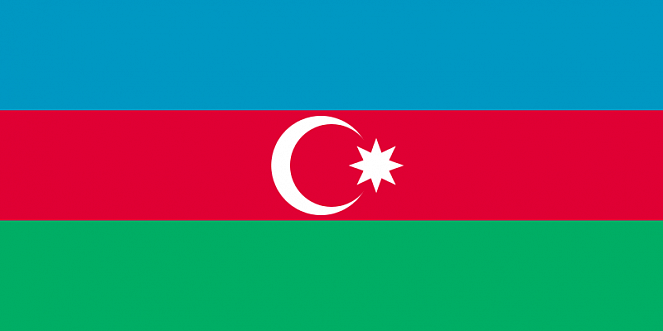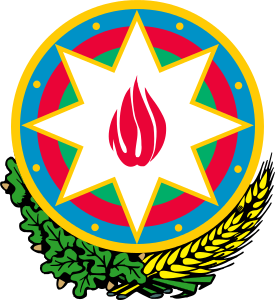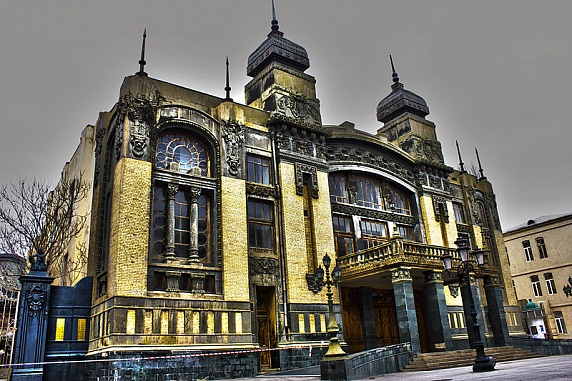 Азербайджанская Республика
Азербайджанская Республика
Foreign Minister Sergey Lavrov’s answers to media questions following the presentation of foreign ambassadors’ letters of credence in the Kremlin, Moscow, November 24, 2020
Question: The coronavirus pandemic has added so many new elements to our lives that we can see this as the emergence of a new world order. Is the new world order still based on the priority of international law when it comes to interstate relations?
Sergey Lavrov: Indeed, the pandemic has had a major impact on all aspects of our lives, including our work and everyday life, but there are principles which Russia always tries to respect. The fact that President Vladimir Putin has received letters of credence from newly appointed ambassadors at an in-person ceremony in the Kremlin, even though there were some adjustments due to security reasons, is proof of our commitment to traditions. This is not just a symbolic gesture. It is very important to respect diplomatic traditions, which are not so much matters of protocol but mutual respect, consideration for each other’s interests and a striving to balance these interests in all cases.
In his greetings to the newly appointed ambassadors, President Putin reaffirmed our commitment to the primacy of international law and the principles of the UN Charter, which are based on the results of the bloody Second World War and which continue to underlie the modern world order. When international players act in accordance with the principles of the UN Charter, in particular, respect for each other’s sovereignty, non-interference in each other’s internal affairs and a peaceful settlement of disputes, it is usually much easier to coordinate decisions, and they are also much more stable. But this does not happen when major powers abuse their authority and influence in regions located far away from their national borders so as to force conditions on conflicting parties. These artificial ceasefires usually do not last.
The main thing is for the conflicting parties to talk with each other. All the other players should only create conditions for this without trying to dictate their will. I would like to cite just one example, which President Putin mentioned at the ceremony today. It is in this spirit, by creating conditions for an agreement between the conflicting parties, that Russia and President Putin coordinated the November 9 agreement on a ceasefire, the cessation of hostilities in Nagorno-Karabakh and the environment for a lasting settlement of this lingering conflict. There are many more examples of the success of our efforts based on the principles of international law. Regrettably, there is also a growing number of examples when conflicts were complicated and exacerbated because these principles were neglected.
Question: You have already mentioned that the ambassadors of foreign states presented their credentials to President of Russia Vladimir Putin today. Diplomatic etiquette has been retained, and contacts continue unabated. Who can we now call Russia’s real friends at a time when sanctions have not been lifted and when groundless accusations against Russia of all deadly sins continue unabated?
Sergey Lavrov: Accusations against Russia continue on any and all pretexts, and more and more often without any pretext whatsoever. As of late, they have been voicing groundless accusations with regard to Russia, although we ask them to present specific facts. This is a small group of countries. An overwhelming majority of states agree with us that it is necessary to respect the principles of sovereign equality, non-interference in domestic affairs and to resolve any disputes through dialogue, for which our Western partners are less and less prepared.
Unfortunately, the European Union is taking a cue from the United States and dictating its will to everyone, placing itself above international law. Our Western colleagues have invented the so-called rules-based world order concept, and they have deliberately made it part of diplomatic and political terminology in circumvention of international law. International law implies complex talks involving all countries without exception. First of all, this concerns the multilateral essence of the UN, which is the main venue for trying to reach agreement.
The West is becoming less and less inclined to waste time on coordinating its approaches with the positions of others. Consequently, the West and an inner circle of its supporters are making decisions that don’t reflect the international community’s universal will in any way, and they are trying to present them as the ultimate truth. This is how the West acts on such matters as the use of chemical weapons, cybersecurity and human rights. It creates its own convenient formats and is trying to remove the relevant subjects from UN auspices, that is, from universal formats that were established for reaching agreement on all aspects of international life.
Nevertheless, an overwhelming majority of states share our approaches to operating on the international scene. I would like to note the associations that unfailingly honour the principle of equality and a search for a balance of interests. They include the Commonwealth of Independent States, the Collective Security Treaty Organisation, the Eurasian Economic Union, the Shanghai Cooperation Organisation and BRICS. Today, President of Russia Vladimir Putin mentioned the East Asia Summit, the Asia Pacific Economic Cooperation and, of course, the G20. It reflects a perception, including of Western countries, that they are no longer able to control the world on their own. The G20 was first established at the top level about ten years ago in place of the so-called G7. It represents the Western countries, all BRICS countries and other states that share the philosophy of the BRICS countries and promote the principles of equality in international affairs.
Today, in addition to the countries that are part of the associations I mentioned, we maintain very warm and friendly relations with many other states. I would like to single out Cuba, a country that symbolises opposition to colonialism, neo-colonialism, dictate and illegal economic sanctions in global affairs. I would like to note our good neighbour Finland, a country that upholds its military and political neutrality and thus makes a major contribution to European security, which now faces very powerful threats. I can name two countries in the Middle East and the Persian Gulf, namely, Saudi Arabia and the United Arab Emirates. In 2019, President of Russia Vladimir Putin paid state visits to these countries. We work on resolving very important problems with them in a close-knit and business-like manner. This includes efforts to maintain the stability of global fuel and energy markets, as well as maintaining security in such highly important regions as the Middle East and North Africa. The Vatican is a small state with tremendous influence and potential. We greatly appreciate the fact that the Holy See maintains close relations with the Russian Orthodox Church in order to strengthen the moral foundations of human life and civilisation and to protect the shared moral values of all world religions. The so-called neoliberal trend is now seriously testing them, and this is particularly evident in Europe.
I do not want to offend anyone. We have a positive agenda with virtually all states that are represented here and whose ambassadors have presented their credentials. We don’t overdramatise the situation when our partners are not completely prepared for this. We don’t impose our friendship on anyone. I am convinced that a realisation of the need to be guided by their own national interests will prevail over a striving to ideologise relations with Russia. When that happens, I believe that we will find many positive aspects in advancing cooperation with these states.
Question: The Open Skies Treaty ceased to exist yesterday. This is obviously not the last international treaty from which the United States has pulled out. What do you expect from the next US administration? Donald Trump has ordered the transition of power to President-elect Joe Biden to begin. Could the United States return to the bosom of international law?
Sergey Lavrov: Diplomacy and foreign policy in general are not areas where we have or don’t have expectations. We must forecast developments and analyse the approaches proposed by our current and future partners. This is what we are doing. It is regrettable that yet another instrument of global stability and security, the Treaty on Open Skies, has passed away because of US decisions. Moreover, these are carbon copy decisions. The United States has terminated the INF Treaty and the Open Skies Treaty allegedly because they have been long and systematically violated by the Russian Federation. It has done this without any substantiation or real reason, keeping silent about dozens of suspected violations by the United States itself. That is an open fact.
Regrettably, the other parties to the Open Skies Treaty continue to mince words, trying to put a brave face and avoiding principled criticism of the United States. They know very well that burying this treaty would be a huge loss to security, primarily in Europe.
We are ready to continue cooperating within the framework of this vital document on the condition that all the other parties honour its requirements. First of all, information collected during observation flights over the member states’ territory must be only provided to the signatories. And second, no areas should be closed for observation flights.
Our position is well known. It is based on the treaty provisions. However, since our western partners do not always behave like gentlemen, we would like to once again formalise the commitment of the remaining western parties to honour these provisions.
It is very sad to see the international security architecture crumbling. President Putin mentioned this. You are aware of our position. We are not going to try to persuade anyone. We have put forth proposals, which have been approved by the majority of UN member states, on the need to strengthen and further develop the system of arms control, disarmament and non-proliferation treaties and agreements. During the previous UN General Assembly session, 188 countries approved a resolution to this effect. Similar support has been provided during the current session as well. But as President Putin has said, if they destroy the last remaining strategic arms reduction treaty, the New START, which will expire on February 5, 2021, it will be their decision. We have a negative opinion on this matter, but it will not be a tragedy for us. We have everything we need to protect our national security.
We reaffirm our readiness to discuss the new situation in the sphere of strategic stability and arms control. We call for coordinating new agreements. But we do not need them more than the United States or any of its allies. We are not dramatising the situation, but we would like the arms control and transparency instruments to be preserved.
Question: Last weekend you and your colleagues visited Armenia and Azerbaijan. What is the outlook for a settlement in Nagorno-Karabakh following your visit? How viable are the agreements reached?
Sergey Lavrov: This is being discussed by professionals and politicians in many countries. The viability of the agreements is being confirmed every day. The ceasefire agreement is fully honoured. There have been unpleasant incidents during the mine-clearing operation, but this is unavoidable after a conflict in which powerful forces were involved on both sides. I would like to repeat that all the commitments signed by President of Azerbaijan Ilham Aliyev, Prime Minister of Armenia Nikol Pashinyan and President of Russia Vladimir Putin are being implemented.
The Russian peacekeepers have launched their activities efficiently and quickly, and are closely interacting with both the Armenian and Azerbaijani communities. They are helping to deal with the humanitarian problems of those who fled the region during the hostilities and are now returning back to Nagorno-Karabakh. They are also helping to rebuild vital utilities infrastructure in the towns located in the zone that is under the responsibility of the peacekeepers.
A Humanitarian Response Centre is being established. During our visit to Baku, the Azerbaijani side expressed interest in actively facilitating and contributing to the work of this centre. These proposals are being analysed. Several dozen Russian organisations and agencies are providing support to this humanitarian operation.
A crucial provision of the November 9 Statement signed by the leaders of Russia, Azerbaijan and Armenia is unblocking all economic, transport and infrastructure connections in the region and lifting the many years long blockade against Armenia, Nagorno-Karabakh and the adjacent regions. This offers enormous positive prospects for the everyday economic and social life of the people in that important and long-suffering region, as well as for a number of strategic projects such as the North-South and West-East transport corridors. Azerbaijan, Armenia, Turkey, Iran and Russia can take part in them. I believe that these possibilities will be used actively now that political obstacles to choosing the best economic routes have been lifted.
When it comes to the humanitarian needs of the local people, I would like to mention our everyday work with international organisations, primarily UN bodies: the Office of the High Commissioner for Refugees, the Office for the Coordination of Humanitarian Affairs, UNESCO, UNICEF, the World Food Programme and the UN Development Programme. All of them can find something to do and a place in the common efforts, which people in Nagorno-Karabakh and neighbouring districts need so much.
We would like to specially thank the International Committee of the Red Cross, which never stopped working in Armenia and Azerbaijan, in Baku, Yerevan and Stepanakert. The ICRC has almost always been present there. ICRC President Peter Maurer has recently visited Moscow where he shared his plans for the programmes that are being implemented in the region.
President Putin has supported the idea that the next voluntary contribution to the ICRC, which Russia makes regularly in the amount of 2 million euros, should be used to support the ICRC work in and around Nagorno-Karabakh.











